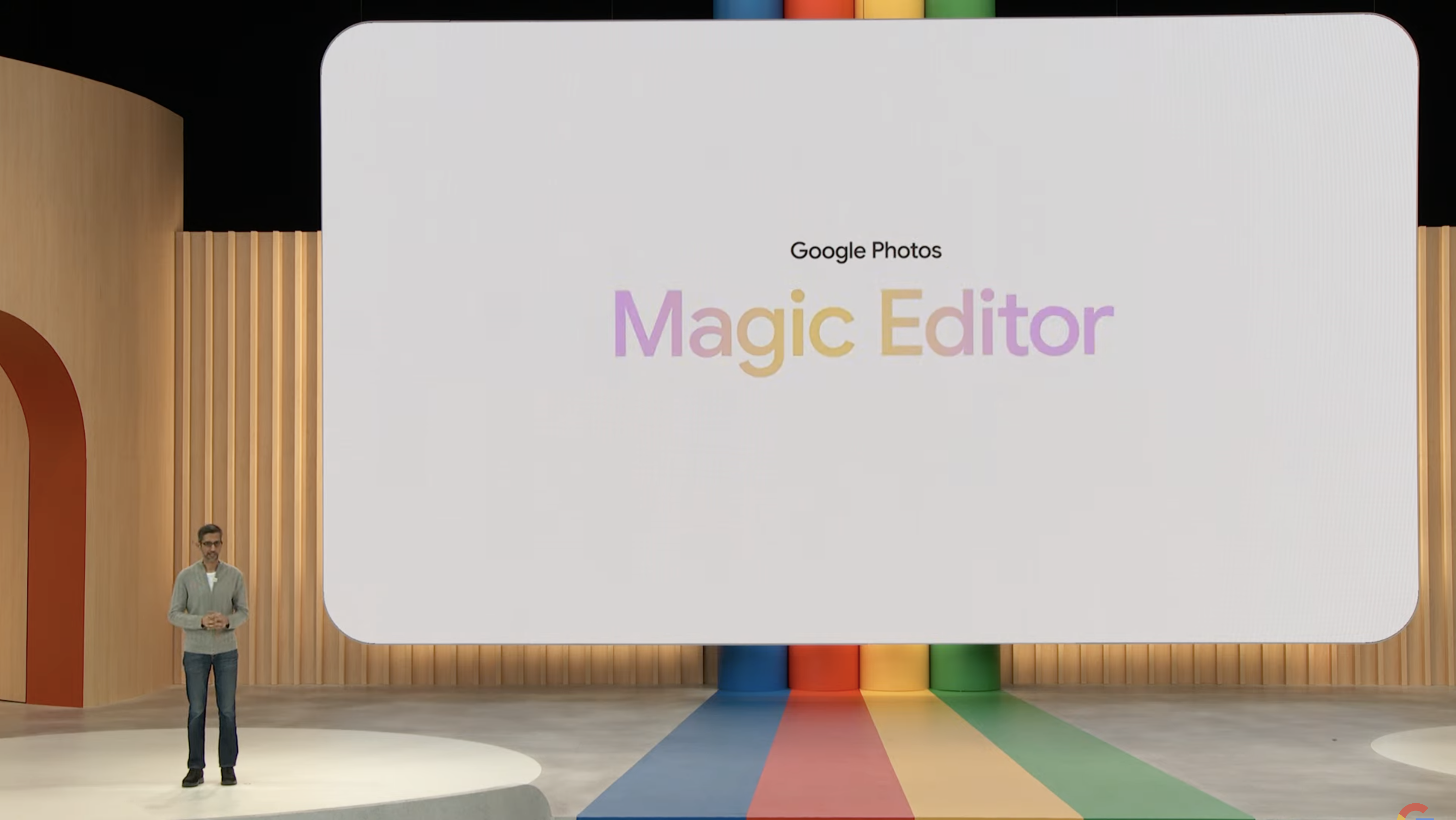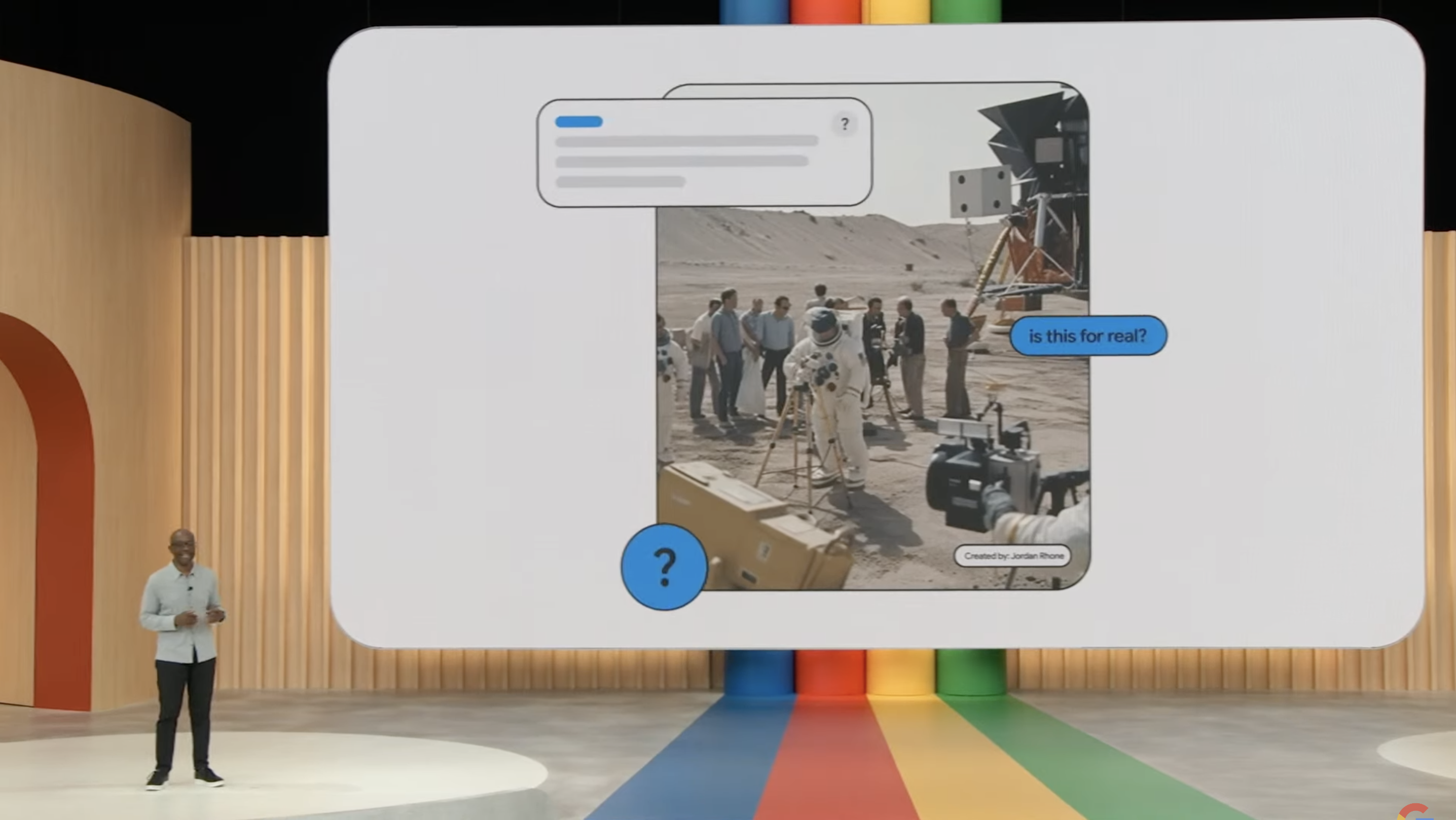Google's AI-powered Magic Editor terrifies me — here's why
Magic Editor simplifies photo editing — for good and for bad

Let the record show that it took a full 9 minutes into this year's Google I/O 2023 before Google's plans for getting a little more artificial intelligence into our lives filled me with blood-chilling terror. Frankly, I'm pleased at my restraint.
AI dominated Google I/O this year, as Google wanted to remind us that any suggestion it had been caught flat-footed by ChatGPT was completely off the mark — and it had the sweeping plans to incorporate AI into nearly every one of its products to prove it. From Maps to Gmail to Google Docs, there's an AI-powered feature that's coming soon with the promise of making your life easier as we cede just a little bit more control to our inevitable robot masters.
All right, so that's probably a little bit of an exaggeration — though after seeing Google's demo for Magic Editor, I'm not quite sure.
In case you missed it, Magic Editor is what happens when Google's relatively benign Magic Eraser tool gets some career advice from Ultron and decides to set its sights a little higher. Magic Eraser debuted with the Pixel 6 and immediately impressed us with its ability to effortlessly remove unwanted people and objects from photos.

Some clueless clod has wandered into the background of that otherwise flawless vacation photo of you and your family? Just summon the Magic Eraser tool in the Google Photos app, and it will automatically detect the unwanted interloper, who you can then zap with a tap. Magic Eraser then uses AI to smooth over the background so that you'd never know anyone was there. The trick works with distracting background images, too.
While Magic Eraser has always had an element of "Out-of-favor Soviet agriculture minister is airbrushed out of photo with Khrushchev" to it, it felt more benign in practice. All you're really doing is sprucing up shots and tidying up backgrounds given the tool's limited scope.
With Magic Editor, that scope will no longer be limited to just removing people. Now you'll be able to brighten the image or even change the placement of the subject, all with no photo editing skills whatsoever. Instead, generative AI does all the heavy lifting for you.
Get instant access to breaking news, the hottest reviews, great deals and helpful tips.
For the Magic Editor demo at Google I/O, CEO Sundar Pichai showed off a vacation photo of a woman standing in front of a waterfall. First, came the tools familiar to anyone who's used Magic Eraser — Pichai removed some people in the background of the photo (fine) and a backpack strap dangling down the woman's coat (sure, why not). Then he brightened the sky, using Magic Editor to make it less gray and more blue (uh... OK). Finally, he picked up the woman and moved her a little bit over the right, completely changing the framing of the shot. (Wait, what?)

The Google I/O audience oohed and aahed. I began white-knuckling my laptop.
There's a fine line between touch-up work and doctoring, and I fear that Magic Editor is going to make it to easy to cross that. Whenever you're able to move subjects around in a photo without anyone being none the wiser, you're tinkering with reality in a way that should set off alarm bells. When Magic Editor comes to Photos later this year, they might as well call it Intro to Deepfakes because that's what this sort of feels like.
In fairness, I should point out that a healthy chunk of Google's I/O keynote was spent addressing the ethical considerations of AI and the responsibility Google feels for helping people spot fakes. Among the tools Google talked up was watermarks for AI-created imagery and extensive metadata for those sorts of images. (It's unclear to me whether that applies to photos and graphics that are completely produced by AI or if photo editing like type done by Magic Editor would be included in those precautions, too.)

I do think Google is sincere in its efforts to make sure that there are sensible rules in place so that AI isn't used to spread misinformation. I also think that bad actors who would use tools precisely for that purpose are not really known for their desire to follow rules, sensible or otherwise.
That's the flip side of technological advances, though. Things like smart locks and security cameras sound like great ideas until you realize how easily an abusive partner can use them to exert control over someone. We all cheered the ability of Apple's AirTag to more precisely track down lost items before it became clear those little trackers were about to become a stalker's favorite tool. (To be fair to Apple, the company has released updates that address that risk, even working with Google on the latest fix.) Technology is only as good as the people putting it to use.
And that's the worrisome thing about Magic Editor — it simplifies photo editing for everyone, not just people who plan to use it for benign purposes.
More from Tom's Guide
- Google Pixel Tablet vs. iPad: Which is right for you?
- Bing with ChatGPT vs Google Bard: Which AI chatbot wins?
- Google Search is getting a huge generative AI upgrade
Philip Michaels is a Managing Editor at Tom's Guide. He's been covering personal technology since 1999 and was in the building when Steve Jobs showed off the iPhone for the first time. He's been evaluating smartphones since that first iPhone debuted in 2007, and he's been following phone carriers and smartphone plans since 2015. He has strong opinions about Apple, the Oakland Athletics, old movies and proper butchery techniques. Follow him at @PhilipMichaels.
 Club Benefits
Club Benefits






